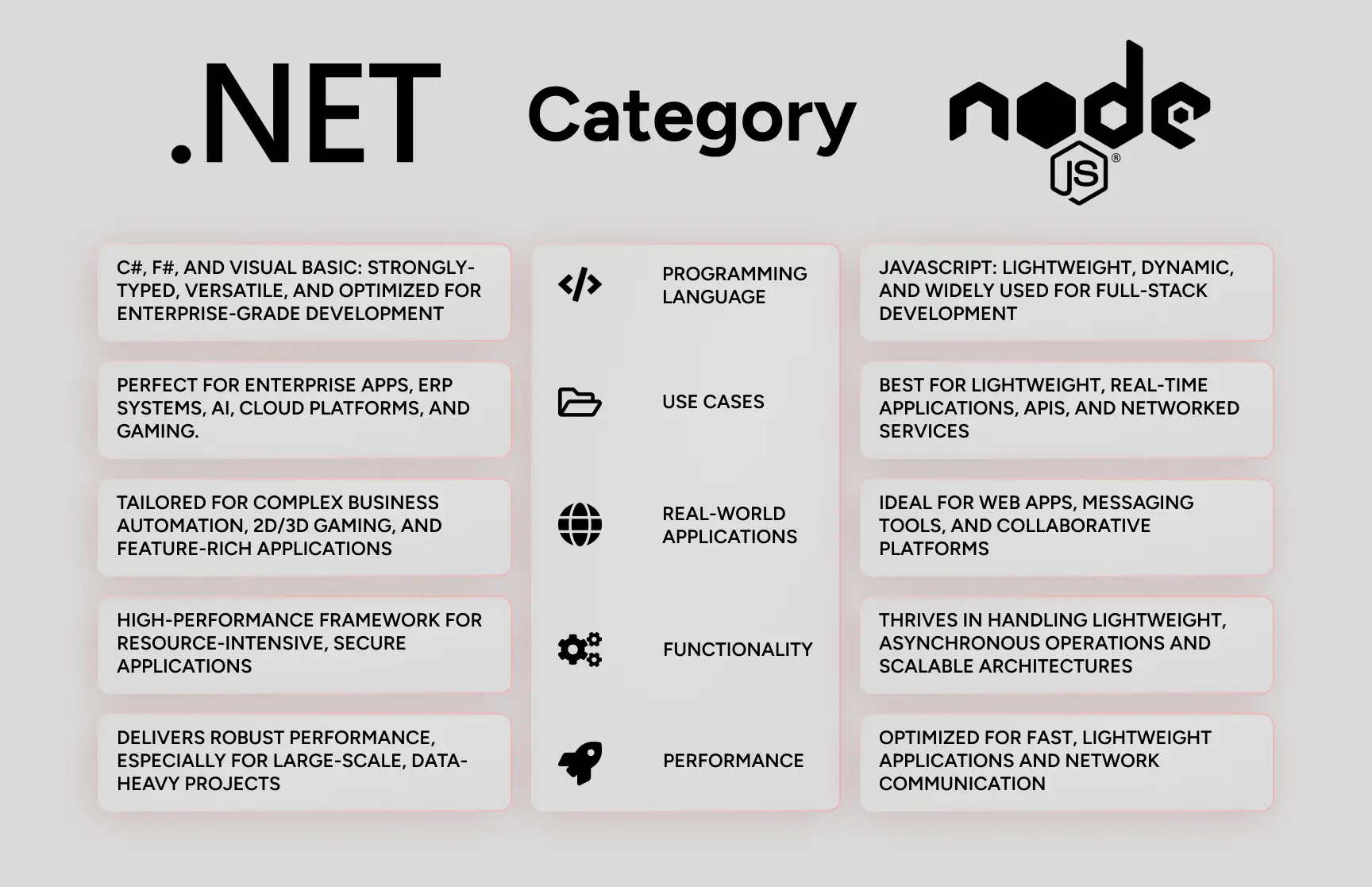.NET vs Node.js: Best Framework Comparison 2025
.NET vs Node.js: Choosing the Right Framework for Your Project
Introduction
Deciding on a framework for your next project can feel overwhelming. In 2025, the debate between .NET and Node.js continues to stir opinions among developers. Both frameworks are powerful but cater to different requirements. By understanding their core strengths and use cases, you’ll be better equipped to choose the ideal one for your needs.
At SMAL Software Development, we frequently compare leading frameworks to help our clients choose the most effective solution. In this edition, we explore the comparison between .NET and Node.js - two dominant forces in the development world.
What Are .NET and Node.js?
What Is .NET?
.NET is Microsoft’s cross-platform development framework, designed for building high-performance applications ranging from enterprise-level systems to small-scale projects. Its compiled nature ensures faster performance, making it a top choice for CPU-intensive applications.
What Is Node.js?
Node.js is an open-source runtime environment enabling JavaScript to execute outside the browser. Known for its non-blocking, event-driven architecture, Node.js excels at creating scalable and real-time applications like chat tools and collaborative platforms.

Performance: The Defining Factor
Raw Speed
.NET consistently outperforms Node.js in handling large-scale applications, especially in CPU-bound and high-concurrency environments. Benchmarks show that .NET applications process requests significantly faster than their Node.js counterparts. For example, .NET can handle a million requests in just six seconds, compared to Node.js taking 47 seconds.
Why the Speed Difference?
- Compiled vs. Interpreted: .NET’s compiled nature allows applications to run closer to the hardware, minimizing overhead and optimizing execution speed. Node.js, relying on JavaScript interpretation, often experiences bottlenecks in resource-heavy scenarios.
- Threading Architecture: While Node.js operates on a single-threaded, event-driven model, .NET supports multithreading, enabling it to handle complex computations more efficiently.
Scalability: Handling Growth Gracefully
For enterprise-level projects, scalability is paramount. Both frameworks scale well, but .NET offers smoother scaling as complexity increases. Its robust architecture ensures reliability when integrating multiple systems or handling large user bases. While Node.js performs admirably in horizontal scaling, its single-threaded design can become a bottleneck for vertical scaling.
Development Tools and Ecosystem
Visual Studio: A Game-Changer
.NET’s Visual Studio is a comprehensive development environment that enhances productivity with features like IntelliSense, debugging, and integrated testing. Node.js developers often use tools like VS Code, which, while powerful, don’t quite match the depth of Visual Studio.
Libraries and Packages
.NET benefits from NuGet, a package manager that simplifies integration with robust libraries and APIs. On the other hand, Node.js’s NPM is extensive but occasionally plagued by dependency issues, making upgrades challenging.
Versatility in Programming Languages
.NET supports multiple languages, including C#, F#, and Visual Basic, offering developers greater flexibility to work in their preferred environment. In contrast, Node.js is primarily tied to JavaScript, though it can also be used with TypeScript - a slightly more statically typed language that ultimately compiles down to JavaScript.
Use Cases: When to Choose Which Framework
When to Choose Node.js
- Real-time chat applications
- Collaborative tools like online editors
- Lightweight, I/O-heavy APIs
When to Choose .NET
- Enterprise-grade web applications
- IoT solutions requiring high performance
- Scalable cloud platforms
- Complex, multi-system integrations
Security: A Critical Component
.NET shines in security with built-in features like role-based authentication and input validation. These features simplify compliance with security standards, making it a go-to choice for enterprise applications. Node.js, while secure, requires additional tools and libraries to match .NET’s security robustness.
Long-Term Viability
.NET benefits from Microsoft’s backing, ensuring regular updates and a vast developer community. This makes it a safe bet for long-term projects requiring consistent support. While Node.js has an active community, its decentralized nature lacks the single-point backing that .NET enjoys.
Conclusion
.NET and Node.js are both excellent frameworks, each with unique advantages. If your project requires enterprise-level reliability, robust security, and superior performance, .NET is the way to go. For lightweight, real-time applications with fast development cycles, Node.js is a strong contender. Ultimately, the best choice depends on your project’s specific needs and your development team’s expertise.
Contact Us
Still undecided about the right framework for your project? Let’s discuss your goals and find the best solution together.
Reach out to us at info@smal.dev, and one of our professionals will get back to you promptly.
FAQs
1. Which framework is faster: .NET or Node.js?
.NET is faster, especially for CPU-intensive tasks, thanks to its compiled architecture and multithreading capabilities.
2. Is Node.js suitable for large-scale applications?
Yes, but .NET provides better tools and stability for complex, enterprise-level projects.
3. Can I use both frameworks in one project?
Yes, hybrid solutions are possible, combining the strengths of both frameworks.
4. Which framework has better tools for debugging?
.NET’s Visual Studio offers a more comprehensive debugging experience compared to Node.js tools like VS Code.
5. Which is more secure, .NET or Node.js?
.NET has built-in security features that make it inherently more secure, particularly for enterprise applications.